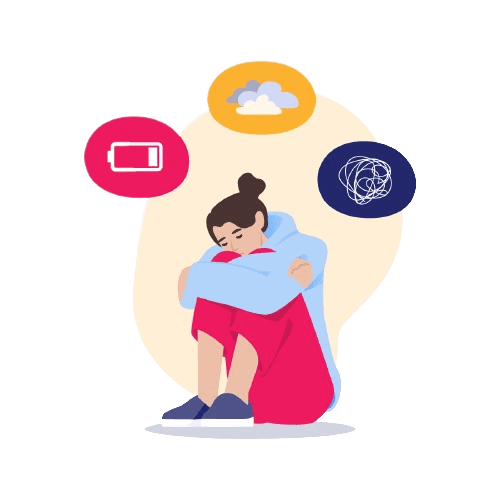Sex Addiction Assessment
3 Min Free Sex Addiction Assessment
What is Sex Addiction?
Sex addiction, also known as compulsive sexual behavior disorder, is a term used to describe a condition in which an individual has an excessive or compulsive preoccupation with sexual thoughts, urges, or behaviors. It is characterized by an inability to control or resist these sexual impulses, leading to negative consequences in various areas of life.
It’s important to note that sex addiction is a controversial and debated concept in the field of psychology and psychiatry. Some professionals argue that it may be more appropriate to conceptualize excessive sexual behaviors as a symptom of other underlying issues, such as trauma, mood disorders, or impulse control disorders. Seeking professional help from a qualified mental health provider, such as a therapist or psychologist specializing in sexual addiction, can provide guidance, assessment, and support for individuals struggling with problematic sexual behaviors.

Symptoms of Sex Addiction
- Preoccupation with Sexual Thoughts
- Compulsive Sexual Behavior
- Inability to Stop or Cut Back
- Escalation of Sexual Activities
- Neglecting Responsibilities
- Loss of Control
- Relationship Problems
- Emotional Distress
- Interference with Daily Life
- Relationship Obsession
- Withdrawal Symptoms
- Failed Attempts at Quitting

Who Can Benefit From This Sex Addiction Assessment?
The Sex Addiction Assessment can benefit individuals who suspect they may be struggling with problematic sexual behaviors and are seeking clarity, validation, and guidance. It is useful for those experiencing distressing consequences related to their sexual behaviors, such as relationship difficulties, emotional distress, or a loss of control.
Partners or family members concerned about a loved one’s sexual behaviors can also benefit from this assessment to gain insight and explore avenues for support. Mental health professionals can utilize the assessment to inform treatment planning and interventions. Additionally, researchers and organizations focusing on sex addiction can use it to gather data, advance knowledge, and provide resources for those seeking help.
Types of Sex Addiction Assessment
Self-Report Questionnaires
These assessments involve individuals answering a series of questions about their sexual behaviors, thoughts, and feelings. They provide a self-reported measure of the presence and severity of symptoms related to sex addiction.
Clinical Interviews
In-depth interviews conducted by a mental health professional to gather information about the individual’s sexual behaviors, thoughts, and associated distress. The interview allows for a comprehensive assessment of the person’s experiences and can aid in diagnosis.
Diagnostic Criteria Assessment
These assessments involve evaluating the individual’s symptoms against established diagnostic criteria for sex addiction or related disorders, such as the criteria outlined in the Diagnostic and Statistical Manual of Mental Disorders (DSM-5).
Sexual History Interview
This type of assessment focuses on obtaining a detailed account of the individual’s sexual history, including past and current sexual behaviors, relationships, and patterns of problematic behavior.
Psychosocial Assessment
A comprehensive evaluation that examines the individual’s psychological, social, and environmental factors that may contribute to their problematic sexual behaviors. It includes factors such as mental health history, trauma exposure, and relationship dynamics.
Screening Tools
Brief screening tools are used to assess the likelihood of sex addiction or problematic sexual behaviors. These tools provide an initial indication of whether further assessment or evaluation is warranted.
Treating Sex Addiction
Treating sex addiction involves a comprehensive approach that focuses on addressing the underlying factors contributing to the problematic sexual behaviors and promoting healthier patterns of sexual expression. Here are common treatment strategies for sex addiction:
- Individual Therapy: Cognitive-behavioral therapy (CBT), psychodynamic therapy, or other evidence-based therapies are commonly used to address the psychological factors contributing to sex addiction. Therapy can help individuals identify triggers, develop coping mechanisms, challenge distorted beliefs, and improve self-esteem and self-control.
- Group Therapy: Participation in group therapy or support groups for individuals with sex addiction can provide a supportive environment for sharing experiences, gaining insight, and receiving peer support. Group therapy can help individuals develop healthier relationship dynamics, enhance social skills, and reduce feelings of isolation or shame.
- Couples or Relationship Therapy: If the individual’s sex addiction has impacted their intimate relationships, couples or relationship therapy can be beneficial. This therapy focuses on improving communication, rebuilding trust, and addressing the impact of sex addiction on the couple’s dynamics.
- Psychoeducation: Learning about the nature of sex addiction, understanding its impact on oneself and others, and gaining knowledge about healthy sexual behaviors can be crucial in the treatment process. Psychoeducation helps individuals develop insight and make informed choices regarding their sexual behaviors.
- Relapse Prevention: Developing relapse prevention strategies is important to maintain progress and prevent a return to problematic sexual behaviors. Identifying triggers, developing healthy coping mechanisms, and creating a relapse prevention plan can help individuals navigate challenges and sustain recovery.
- Pharmacological Treatment: In some cases, medication may be prescribed to address underlying mental health conditions that contribute to sex addiction, such as depression, anxiety, or impulse control disorders. Medication can help manage symptoms and support overall recovery.
- Lifestyle Changes: Engaging in healthy lifestyle practices, including regular exercise, stress management techniques, and self-care activities, can contribute to overall well-being and reduce the likelihood of engaging in compulsive or risky sexual behaviors.
It’s important for individuals seeking treatment for sex addiction to work with qualified mental health professionals experienced in treating addiction and sexual disorders. The treatment plan should be tailored to individual needs and may involve a combination of approaches to address the multifaceted nature of sex addiction.

